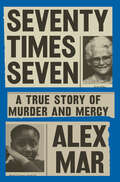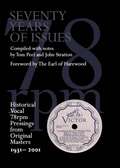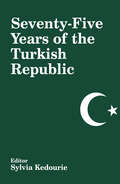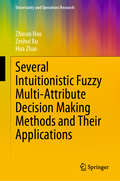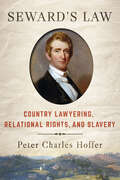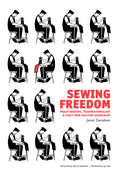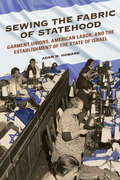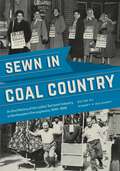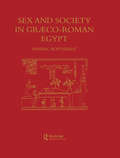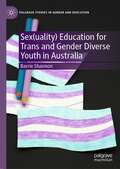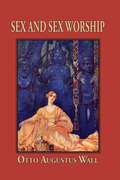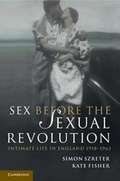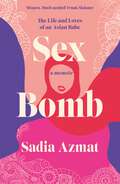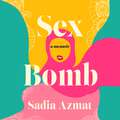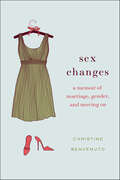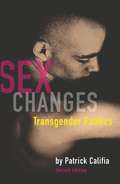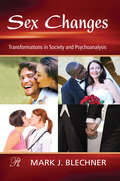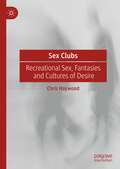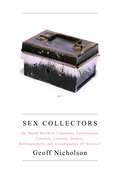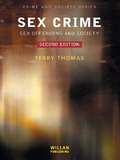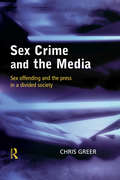- Table View
- List View
Seventy Times Seven: A True Story of Murder and Mercy
by Alex Mar&“Alex Mar&’s bold yet sensitive account of one of America&’s youngest death row inmates—and the people whose lives she forever changed—is intimately reported, deeply moving, and unforgettable.&” —Robert Kolker, New York Times bestselling author of Hidden Valley Road&“An absorbing work of social history and a story about the mystery and miracle of forgiveness. This is a book of awesome scope, and it deserves to be read with attention.&” —Hilary Mantel, Booker Prize–winning author of the Wolf Hall trilogyA masterful, revelatory work of literary non-fiction about a teenage girl&’s shocking crime—and its extraordinary aftermathOn a spring afternoon in 1985 in Gary, Indiana, a fifteen-year-old girl kills an elderly woman in a violent home invasion. In a city with a history of racial tensions and white flight, the girl, Paula Cooper, is Black, and her victim, Ruth Pelke, is white and a beloved Bible teacher. The press swoops in.When Paula is sentenced to death, no one decries the impending execution of a tenth grader. But the tide begins to shift when the victim&’s grandson Bill forgives the girl, against the wishes of his family, and campaigns to spare her life. This tragedy in a midwestern steel town soon reverberates across the United States and around the world—reaching as far away as the Vatican—as newspapers cover the story on their front pages and millions sign petitions in support of Paula.As Paula waits on death row, her fate sparks a debate that not only animates legal circles but raises vital questions about the value of human life: What are we demanding when we call for justice? Is forgiveness an act of desperation or of profound bravery? As Bill and Paula&’s friendship deepens, and as Bill discovers others who have chosen to forgive after terrible violence, their story asks us to consider what radical acts of empathy we might be capable of.In Seventy Times Seven, Alex Mar weaves an unforgettable narrative of an act of violence and its aftermath. This is a story about the will to live—to survive, to grow, to change—and about what we are willing to accept as justice. Tirelessly researched and told with intimacy and precision, this book brings a haunting chapter in the history of our criminal justice system to astonishing life.
Seventy Years of Issues: Historical Vocal 78 rpm Pressings from Original Masters 1931-2001
by Tom Peel John StrattonShort-listed for the 2002 Award for Excellence in Historical Recorded Sound Research In the seventy years since 1931, various organizations large and small, including several semi-private ones, have issued or re-issued various original 78 rpm recordings from original metal plates. No comprehensive listing of these has ever before appeared; this is the first, and gathers together all the various information of ongoing interest. This is a most important addition to the record-collecting bibliography.
Seventy-five Years of the Turkish Republic
by Sylvia KedourieThis collection examines the issues which - over the first 75 years of the Turkish Republic - have shaped, and will continue to influence, Turkey's foreign and domestic policy: the legacy of the Ottoman empire, the concept of citizenship, secular democracy, Islamicism and civil-military relations.
Several Intuitionistic Fuzzy Multi-Attribute Decision Making Methods and Their Applications (Uncertainty and Operations Research)
by Zeshui Xu Zhinan Hao Hua ZhaoThis book introduces readers to the latest advances in and approaches to intuitionistic fuzzy decision-making methods. To do so, it explores a range of applications to practical decision-making problems, together with representative case studies. Examining a host of decision-making methods, most of which are based on intuitionistic fuzzy aggregation operators, its goal is to offer readers a new way to study decision-making methods in the intuitionistic fuzzy environment. Chiefly intended for practitioners and researchers working in the areas of risk management, decision-making under uncertainty, and operational research, the book can also be used as supplementary material for graduate and senior undergraduate courses in these areas.
Seward's Law: Country Lawyering, Relational Rights, and Slavery
by Peter Charles HofferIn Seward's Law, Peter Charles Hoffer argues that William H. Seward's legal practice in Auburn, New York, informed his theory of relational rights—a theory that demonstrated how the country could end slavery and establish a practical form of justice. This theory, Hoffer demonstrates, had ties to Seward's career as a country lawyer. Despite his rise to prominence, and indeed preeminence, as a US secretary of state, Seward's country-lawyer mentality endured throughout his life, as evinced in his personal attitudes and professional conduct. Relational rights, identified and termed here for the first time by Hoffer, are communal and reciprocal, what everyone owed to every other member of their community. Such rights are at the center of a jurisprudential outlook that arises directly from living in a village. Though Seward was limited by the Victorian mores and the racialist presumptions of his day, the concept of relational rights that animated him was the natural antithesis to the theories and practices of slavery. In the legal regime underpinning the institution, masters owed nothing to their bondmen and women, while those enslaved unconditionally owed life and labor to their masters. The irrepressible conflict was, for Seward, jurisprudential as well as moral and political. Hoffer's leading assumption in Seward's Law is that a lifetime spent as a lawyer influences how a person responds to everyday challenges. Seward remained a country lawyer at heart, and that fact defined the course of his political career.
Sewing Freedom
by Barry Pateman Jared DavidsonSewing Freedom is the first in-depth study of anarchism in New Zealand during the turbulent years of the early 20th century-a time of wildcat strikes, industrial warfare, and a radical working class counter-culture. Interweaving biography, cultural history, and an array of archival sources, this engaging account unravels the anarchist-cum-bomber stereotype by piecing together the life of Philip Josephs-a Latvian-born Jewish tailor, antimilitarist, and founder of the Wellington Freedom Group. Anarchists like Josephs not only existed in the 'Workingman's Paradise' that was New Zealand, but were a lively part of its labour movement and the class struggle that swept through the country, imparting uncredited influence and ideas. Sewing Freedom places this neglected movement within the global anarchist upsurge, and unearths the colourful activities of New Zealand's most radical advocates for social and economic change. Includes illustrations by Icky from Justseeds and a foreword by Barry Pateman (Kate Sharpley Library Archivist and Associate Editor at the Emma Goldman Papers)."Davidson has produced much more than a soundly researched and very engaging biography... this is an excellent, wide-ranging contribution to our knowledge of the international (and indeed transnational) anarchist movement, and sweeps us along in a fascinating story that takes us from the pogroms in Russian Latvia, to the working-class slums of Victorian Glasgow, to the early struggles of the nascent labour movement in New Zealand."-Dr David Berry, author of A History of the French Anarchist Movement"Many millions of words have been written on New Zealand history. The labour movement does not feature prominently in this vast corpus; in fact, quite the contrary. And within this relatively sparse coverage, anarchism is almost invariably assigned at best a passing mention. We must be grateful for Davidson's determination to restore an anarchist voice to the history of the outermost reach of the British Empire."-Dr Richard Hill, Professor of New Zealand Studies & author of Iron Hand in the Velvet Glove"A ground breaking tale of a rebel life, skillfully unearthed by Jared Davidson. A must read."-Lucien van der Walt, co-author of Black Flame
Sewing Women: Immigrants and the New York City Garment Industry (Columbia Comparative Studies On Ethnicity And Race)
by Margaret ChinMany Latino and Chinese women who immigrated to New York City over the past several decades found work in the garment industry-an industry well known for both hiring immigrants and its harsh working conditions. In the 1990s, the garment industry was one of the largest immigrant employers in New York City and workers in Chinese- and Korean-owned factories produced 70 percent of all manufactured clothing in New York City. Based on extensive interviews with workers and employers, Margaret M. Chin offers a detailed and complex portrait of the work lives of Chinese and Latino garment workers. Chin, whose mother and aunts worked in Chinatown's garment industry, also explores how immigration status, family circumstances, ethnic relations, and gender affect the garment industry workplace. In turn, she analyzes how these factors affect whom employers hire and what wages and benefits are given to the employees.Chin's study contrasts the working conditions and hiring practices of Korean- and Chinese-owned factories. Her comparison of the two practices illuminates how ethnic ties both improve and hinder opportunities for immigrants. While both sectors take advantage of workers and are characterized by low wages and lax enforcement of safety regulations-there are crucial differences. In the Chinese sector, owners encourage employees, almost entirely female, to recruit new workers, especially friends and family. Though Chinese workers tend to be documented and unionized, this work arrangement allows owners to maintain a more paternalistic relationship with their employees. Gender also plays a major role in channeling women into the garment industry, as Chinese immigrants, particularly those with children, tend to maintain traditional gender roles in the workplace. Korean-owned shops, however, hire mostly undocumented Mexican and Ecuadorian workers, both male and female. These workers tend not to have children and are thus less tied to traditional gender roles. Unlike their Chinese counterparts, Korean employers hire workers on their own terms and would rather not allow current employees to influence their decisions. Chin's work also provides an overview of the history of the garment industry, examines immigration strategies, and concludes with a discussion of changes in the industry in the aftermath of 9/11.
Sewing the Fabric of Statehood: Garment Unions, American Labor, and the Establishment of the State of Israel (The Working Class in American History)
by Adam M HowardLong a bastion of Jewish labor power, garment unions provided financial and political aid essential to founding and building the nation of Israel. Throughout the project, Jewish labor often operated outside of official channels as non-governmental organizations. Adam Howard explores the untold story of how three influential garment unions worked alone and with other Jewish labor organizations in support of a new Jewish state. Sewing the Fabric of Statehood reveals a coalition at work on multiple fronts. Sustained efforts convinced the AFL and CIO to support Jewish development in Palestine through land purchases for Jewish workers and encouraged the construction of trade schools and cultural centers. Other activists, meanwhile, directed massive economic aid to Histadrut, the General Federation of Jewish Workers in Palestine, or pressured the British and American governments to recognize Israel's independence. What emerges is a powerful account of the motivations and ideals that led American labor to forge its own foreign policy and reshape both the postwar world and Jewish history.
Sewn in Coal Country: An Oral History of the Ladies’ Garment Industry in Northeastern Pennsylvania, 1945–1995
by Robert P. WolenskyBy the mid-1930s, Pennsylvania’s anthracite coal industry was facing a steady decline. Mining areas such as the Wyoming Valley around the cities of Wilkes-Barre and Pittston were full of willing workers (including women) who proved irresistibly attractive to New York City’s "runaway shops"—ladies’ apparel factories seeking lower labor and other costs. The International Ladies’ Garment Workers’ Union (ILGWU) soon followed, and the Valley became a thriving hub of clothing production and union activity. This volume tells the story of the area’s apparel industry through the voices of men and women who lived it. Drawing from an archive of over sixty audio-recorded interviews within the Northeastern Pennsylvania Oral and Life History Collection, Sewn in Coal Country showcases sixteen stories told by workers, shop owners, union leaders, and others. The interview subjects recount the ILGWU-led movement to organize the shops, the conflicts between the district union and the national office in New York, the solidarity unionism approach of leader Min Matheson, the role of organized crime within the business, and the failed efforts to save the industry in the 1980s and 1990s. Robert P. Wolensky places the narratives in the larger context of American clothing manufacturing during the period and highlights their broader implications for the study of labor, gender, the working class, and oral history.Highly readable and thoroughly enlightening, this significant contribution to the study of labor history and women’s history will appeal to anyone interested in the relationships among workers, unions, management, and community; the effects of economic change on an area and its residents; the role of organized crime within the industry; and Pennsylvania history—especially the social history of industrialization and deindustrialization during the twentieth century.
Sewn in Coal Country: An Oral History of the Ladies’ Garment Industry in Northeastern Pennsylvania, 1945–1995
by Robert P. WolenskyBy the mid-1930s, Pennsylvania’s anthracite coal industry was facing a steady decline. Mining areas such as the Wyoming Valley around the cities of Wilkes-Barre and Pittston were full of willing workers (including women) who proved irresistibly attractive to New York City’s “runaway shops”—ladies’ apparel factories seeking lower labor and other costs. The International Ladies’ Garment Workers’ Union (ILGWU) soon followed, and the Valley became a thriving hub of clothing production and union activity. This volume tells the story of the area’s apparel industry through the voices of men and women who lived it. Drawing from an archive of over sixty audio-recorded interviews within the Northeastern Pennsylvania Oral and Life History Collection, Sewn in Coal Country showcases sixteen stories told by workers, shop owners, union leaders, and others. The interview subjects recount the ILGWU-led movement to organize the shops, the conflicts between the district union and the national office in New York, the solidarity unionism approach of leader Min Matheson, the role of organized crime within the business, and the failed efforts to save the industry in the 1980s and 1990s. Robert P. Wolensky places the narratives in the larger context of American clothing manufacturing during the period and highlights their broader implications for the study of labor, gender, the working class, and oral history.Highly readable and thoroughly enlightening, this significant contribution to the study of labor history and women’s history will appeal to anyone interested in the relationships among workers, unions, management, and community; the effects of economic change on an area and its residents; the role of organized crime within the industry; and Pennsylvania history—especially the social history of industrialization and deindustrialization during the twentieth century.
Sex & Society In Graeco-Roman
by MontserratFirst published in 1996. Routledge is an imprint of Taylor & Francis, an informa company.
Sex (Palgrave Studies in Gender and Education)
by Barrie ShannonThis book examines young trans and gender diverse Australians’ views of school-based sex education. The analysis is informed by a queer epistemology that acknowledges the systematic and institutional erasure of trans subjectivities through highly medicalised systems of categorisation. Drawing on primary qualitative data, the author emphasises the accounts of trans and gender diverse young people as they relate to sex education at school, and how they undertake informal learning about sex, gender and identity in other areas of their lives.Ultimately, the book problematises the assumption that the sex education classroom is the most appropriate vehicle for social justice education in relation to queer issues. Queer issues and sex education tend to be packaged together discursively, deliberately or by association in dominant media narratives. However, this discourse constrains queer identities to the realm of sex and health, and therefore does not engage with the social citizenship of queer people. Further, this limits the capacity of schools and teachers to meaningfully explore diversity in the classroom, as sex education is front-and-centre in the so called ‘culture wars’ about gender, sexuality, youth and schools.
Sex And Sex Worship: (phallic Worship) A Scientific Treatise On Sex, Its Nature And Function, And Its Influence On Art, Science, Architecture, And Religion--with Special Reference To Sex Worship And Symbolism
by Otto Augustus WallSex is at the very heart of life, and this classic illustrated study of sex, its nature and function, and its influence on art, science, architecture and religion contains a wealth of information on sex beliefs, practices and worship in other cultures and periods of history stretching back to ancient times. Drawing on a wide range of sources including private collections of erotica, Wall shows how people in other times and places have dealt with the timeless themes of sexuality, male, female, love, passion, lust, desire and worship, dealing with sex as a private practice and also as public celebration. This edition first published in 2006. Routledge is an imprint of Taylor & Francis, an informa company.
Sex Before the Sexual Revolution: Intimate Life In England, 1918-1963
by Simon Szreter Kate FisherWhat did sex mean for ordinary people before the sexual revolution of the 1960s and 1970s, who were often pitied by later generations as repressed, unfulfilled and full of moral anxiety? This book provides the first rounded, first-hand account of sexuality in marriage in the early and mid-twentieth century. These award-winning authors look beyond conventions of silence among the respectable majority to challenge stereotypes of ignorance and inhibition. Based on vivid, compelling and frank testimonies from a socially and geographically diverse range of individuals, the book explores a spectrum of sexual experiences, from learning about sex and sexual practices in courtship, to attitudes to the body, marital ideals and birth control. It demonstrates that while the era's emphasis on silence and strict moral codes could for some be a source of inhibition and dissatisfaction, for many the culture of privacy and innocence was central to fulfilling and pleasurable intimate lives.
Sex Bomb: The Life and Loves of an Asian Babe
by Sadia AzmatFor fans of Everything I Know About Love, Wrong Knickers and The Right Sort of Girl this is the incredibly honest and brilliantly raunchy memoir you don't want to miss.'Thoughtful, occasionally shocking and consistently hilarous: Sex Bomb is an absolute must read.' JAMES FELTON'A hilarious, courageous and compelling read that explores the complicated relationship between culture, religion, identity and sexuality within the British Asian community. A must read for those who have lived it, and for those who haven't.' ANITA BHAGWANDAS__________Sadia is a comedian who loves sex. She is also a hijab-wearing Muslim woman. The two are in a lifelong relationship, but it's complicated.Sadia Azmat has many different sides to her, she is the good Muslim sister and the loud and proud comedian, she is the quiet and loving friend and the horny and outspoken one. So why does everyone put her in a box and expect her to choose between one or the other?In a life of ups and downs, swings and roundabouts, Sadia has learnt the hard way that she can embrace her sexuality and be a proud British-Indian Muslim. From discovering her sexual identity after seeing a copy of Asian Babes on the shelf in the corner shop to rejecting an arranged marriage and feeling distanced from her culture; from her experience dating white and Asian men to her tumultuous relationship with her headscarf, Sadia is unafraid to spill the honest truth. Sadia finds the funny in every experience she has and this book explodes with personality, warmth and joy. This book is for anyone who has ever felt different or alone; allow this book to fill you up and propel you forward, because we all deserve to feel like a Sex Bomb.__________'Sex Bomb is so hilarious, raw and poignant. I couldn't put it down!' JENA FRIEDMAN'Sex Bomb is a privilege and a joy to read, and everybody you've ever met should read it.' ANNE T. DONAHUE
Sex Bomb: The Life and Loves of an Asian Babe
by Sadia AzmatFor fans of Everything I Know About Love, Wrong Knickers and The Right Sort of Girl this is the incredibly honest and brilliantly raunchy memoir you don't want to miss.'Thoughtful, occasionally shocking and consistently hilarous: Sex Bomb is an absolute must read.' JAMES FELTON'A hilarious, courageous and compelling read that explores the complicated relationship between culture, religion, identity and sexuality within the British Asian community. A must read for those who have lived it, and for those who haven't.' ANITA BHAGWANDAS__________Sadia is a comedian who loves sex. She is also a hijab-wearing Muslim woman. The two are in a lifelong relationship, but it's complicated.Sadia Azmat has many different sides to her, she is the good Muslim sister and the loud and proud comedian, she is the quiet and loving friend and the horny and outspoken one. So why does everyone put her in a box and expect her to choose between one or the other?In a life of ups and downs, swings and roundabouts, Sadia has learnt the hard way that she can embrace her sexuality and be a proud British-Indian Muslim. From discovering her sexual identity after seeing a copy of Asian Babes on the shelf in the corner shop to rejecting an arranged marriage and feeling distanced from her culture; from her experience dating white and Asian men to her tumultuous relationship with her headscarf, Sadia is unafraid to spill the honest truth. Sadia finds the funny in every experience she has and this book explodes with personality, warmth and joy. This book is for anyone who has ever felt different or alone; allow this book to fill you up and propel you forward, because we all deserve to feel like a Sex Bomb.__________'Sex Bomb is so hilarious, raw and poignant. I couldn't put it down!' JENA FRIEDMAN'Sex Bomb is a privilege and a joy to read, and everybody you've ever met should read it.' ANNE T. DONAHUE
Sex Bomb: a 'hilarious, raw and poignant' memoir
by Sadia AzmatThe entertaining, hilarious and conversation-shifting memoir about sex and life from the comedian, podcast host and writer, Sadia Azmat.Sadia is a comedian who loves sex. She is also a hijab-wearing Muslim woman. The two are in a lifelong relationship, but it's complicated.For fans of Everything I Know About Love, Wrong Knickers and The Right Sort of Girl this is the sidesplittingly funny and brilliantly raunchy memoir you don't want to miss.Sadia Azmat has many different sides to her, she is the good Muslim sister and the loud and proud comedian, she is the quiet and loving friend and the horny and outspoken one. So why does everyone put her in a box and expect her to choose between one or the other?In a life of ups and downs, swings and roundabouts, Sadia has learnt the hard way that she can embrace her sexuality and be a proud British-Indian Muslim. From discovering her sexual identity after seeing a copy of Asian Babes on the shelf in the corner shop to rejecting an arranged marriage and feeling distanced from her culture; from her experience dating white and Asian men to her tumultuous relationship with her headscarf, Sadia is unafraid to spill the honest truth. Sadia finds the funny in every experience she has and this book explodes with personality, warmth and joy. This audiobook is for anyone who has ever felt different or alone; allow this audiobook to fill you up and propel you forward, because we all deserve to feel like a Sex Bomb.(P) 2022 Headline Publishing Group Ltd
Sex Changes: A Memoir of Marriage, Gender, and Moving On
by Christine BenvenutoWhat do you do when the other woman is your husband? A wife's memoir of her husband's sex changeChristine Benvenuto had been married for more than twenty years—with three young children—when her husband turned to her one night in bed and said "I'm thinking constantly about my gender." He was unhappy in his body and wanted to become a woman.Part memoir, part voyeur's look into a marriage, Sex Changes is a journey through the end of a marriage and out the other side. We see a woman, desperate to save her family and shelter her children, discover a well of strength and resilience she never knew she had. We learn what to tell the neighbors when your husband starts wearing heels with his shirts and ties. We see a woman open herself to a group of friends who travel with her through her darkest times, provide light and levity throughout—and who offer the opportunity to learn how to give as well as receive the love and support of true friendship. When she lost her husband to skirts and hormones, life made Chris a better woman. Sex Changes is the story of what one woman discovered about herself in the midst of the conflagration of her family. Fiercely funny, self-lacerating, and not entirely politically correct, Sex Changes is a journey of love and anguish told with hilarity, heartbreak and a lot of soul searching. It is about the mysteries in every marriage, the secrets we chose to keep, and the freedom that the truth can bring.
Sex Changes: The Politics of Transgenderism (2nd ed.)
by Patrick CalifiaThis 2nd edition includes a new Introduction by the author, which discusses his sexual transition to the male gender which occurred between the two editions. Other than in the short introduction (which follows the long Preface chapter), there are no autobiographical references. Sex Changes is a political analysis of many topics as related to transsexuality. Two chapters cover the earliest period of transsexual autobiography and then more current ones, comparing their differences and their impacts on the mainstream community. There is history of Gender Identity Clinics and their function, of surgery and of feminist backlash. Hard to find, but present, are a chapter on partners of transsexuals and one on the growing activism seen stemming from the community itself. Although the title uses the word "transgender" the majority of the book is focused on full gender change: transsexuality. In most chapters and topics, the author keeps his personal perspective aside, and neutral academic criticism is leveled at research methods and resultant findings. However, in a couple chapters, especially Chapter 4, "The Berdache Wars and 'Passing Women' Follies: Transphobia in Gay Academia," Califia makes no attempt to be neutral and is quite adamant about his own negative opinion of prior academic analytical reports. Throughout the book, footnotes and references are extensive, as is a detailed index.
Sex Changes: Transformations in Society and Psychoanalysis (Psychoanalysis in a New Key Book Series)
by Mark J. BlechnerThe last half-century has seen enormous changes in society’s attitude toward sexuality. In the 1950s, homosexuals in the United States were routinely arrested; today, homosexual activity between consenting adults is legal in every state, with same-sex marriage legal in Massachusetts and Connecticut. In the 1950s, ambitious women were often seen as psychopathological and were told by psychoanalysts that they had penis envy that needed treatment; today, a woman has campaigned for President of the United States. Mark Blechner has lived and worked through these startling changes in society, and Sex Changes collects papers he has written over the last 45 years on sex, gender, and sexuality. Interspersed with these papers are reflections on the changes that have occurred during that time period, both within the scope of society at large as well as in his personal experiences inside and outside of the therapeutic setting. He shows how changes in society, changes in his life, and changes in his writing on sexuality - as well as changes within psychoanalysis itself - have affected one another. One hundred years ago, psychoanalysis was at the cutting edge of new ideas about sex and gender, but in the latter half of the 20th Century, psychoanalysts were often seen as reactionary upholders of society’s prejudices. Sex Changes seeks to restore the place of psychoanalysis as the "once and future queer science," and aims for a radical shift in psychoanalytic thinking about sexuality, gender, normalcy, prejudice, and the relationship of therapeutic aims and values.
Sex Clubs: Recreational Sex, Fantasies and Cultures of Desire
by Chris HaywoodThis book explores the hidden world of sex clubs. These are not strip clubs, lap dancing clubs, or brothels; these are clubs that men and women visit to have no strings attached sex. Each year sex clubs, traditionally called swingers clubs, are visited by over one million people in the UK. Using social and cultural theory, the author explores the cultures of desire through themes such as erotic hierarchies, atmospheres and power, women and sexual fantasies, men, masculinity and non-consent, hypersexualized black bodies, heterosexuality and queer heteroeroticism and trans desires. From cuckolding to group sex, bareback sex to intergenerational sex, partner swapping and threesomes to BDSM and fetish nights, sex clubs host a diverse range of sexual encounters that are part of a growing trend of recreational sex. Despite there being over 40 clubs in the UK alone, we continue to know very little about who is visiting the club, why they go there and what people do. This book—drawing upon ethnographies, interviews and large-scale quantitative data—is one of the first in the field to systematically collect and critically interrogate sex clubs and their erotic encounters. This will not only be the first sustained social and cultural analysis of sex clubs themselves, but it also aims to lure the reader into the club through discussions of ethnographic encounters, enabling them to experience the unique dynamics of sex clubs and their cultures of desire.
Sex Collectors
by Geoff NicholsonThough you might not encounter the subject in Artforum or stumble across it at Sotheby's, the thriving business of erotica is a mixture of sophistication and seduction, an underground world of eccentric artists and serious collectors. In Sex Collectors, Geoff Nicholson hunts down an assortment of these obsessives around the world. From the Florida grandma with five million dollars' worth of sexual collectibles to Third Eye Blind's manager, who owns more than eighty thousand men's magazines, Nicholson celebrates these collectors and the occasionally beautiful, frequently bizarre, and always fascinating objects they have amassed. He accompanies Linda Lovelace, the star of Deep Throat, as she is taken on a tour of a collection devoted to her. Days spent in the Kinsey archives reveal the cultural artifacts resulting from the sexual awakening of public America, as well as boxes with labels such as "Phallus with Agricultural Tools" and "Scarf Trick when Folded." Nicholson journeys to Germany to visit with the legendary Karl-Ludwig Leonhardt, sex collector extraordinaire of first edition volumes such as Flagellation pour couples pervertis and Tender Bottoms, erotic Picassos, and notes handwritten by the Marquis de Sade. Throughout his exploration of some of the wildest collections in the world, Nicholson's discussion of collecting as an expression of self and psychology goes hand in hand with his gleeful discovery of the seventh giant phallus used in Stanley Kubrick's A Clockwork Orange, Hitler's creepily erotic personalized bookplate, and a woman who has a plaster cast of Jimi Hendrix's penis. Sex Collectors is a winning story of one man's attempt to collect collectors, to reveal the neuroses that drive some people to collect, and to have good, dirty, high-minded fun while doing it.
Sex Collectors
by Geoff NicholsonThough you might not encounter the subject in Artforum or stumble across it at Sotheby's, the thriving business of erotica is a mixture of sophistication and seduction, an underground world of eccentric artists and serious collectors. In Sex Collectors, Geoff Nicholson hunts down an assortment of these obsessives around the world. From the Florida grandma with five million dollars' worth of sexual collectibles to Third Eye Blind's manager, who owns more than eighty thousand men's magazines, Nicholson celebrates these collectors and the occasionally beautiful, frequently bizarre, and always fascinating objects they have amassed. He accompanies Linda Lovelace, the star of Deep Throat, as she is taken on a tour of a collection devoted to her. Days spent in the Kinsey archives reveal the cultural artifacts resulting from the sexual awakening of public America, as well as boxes with labels such as "Phallus with Agricultural Tools" and "Scarf Trick when Folded." Nicholson journeys to Germany to visit with the legendary Karl-Ludwig Leonhardt, sex collector extraordinaire of first edition volumes such as Flagellation pour couples pervertis and Tender Bottoms, erotic Picassos, and notes handwritten by the Marquis de Sade. Throughout his exploration of some of the wildest collections in the world, Nicholson's discussion of collecting as an expression of self and psychology goes hand in hand with his gleeful discovery of the seventh giant phallus used in Stanley Kubrick's A Clockwork Orange, Hitler's creepily erotic personalized bookplate, and a woman who has a plaster cast of Jimi Hendrix's penis. Sex Collectors is a winning story of one man's attempt to collect collectors, to reveal the neuroses that drive some people to collect, and to have good, dirty, high-minded fun while doing it.
Sex Crime
by Terry ThomasThis book provides an account of the nature and extent of sex crime and offending in contemporary Britain, and the policies and legislative actions taken to combat this. Sex offenders have become 'demonised' figures, which has made it essential to explain the phenomena and to formulate appropriate policies and law. This second edition builds upon the successful first edition, and is revised and expanded to reflect the many developments which have taken place in this field. The book now covers both criminal justice approaches to sexual offending and the civil processes towards greater protection from sexual offending. updated and expanded second edition of established textnow covers both criminal justice approaches to sexual offending and civil processesanalyses impact of Sexual Offences Act of 2003, new measures on internet sex crime and pornography, establishment of Criminal Records Bureau and international trafficking
Sex Crime and the Media
by Chris GreerSex crime has become one of the most intense areas of public and political concern in recent decades. This book explores the complex influences that shape its construction in the press. Media representations give important clues as to how we should perceive the nature and extent of sex crime, how we should think and feel about it, how we should respond to it, and the measures that might be taken to reduce risk. Understanding the media construction of sex crime is central to understanding its meaning and place in our everyday lives. Unlike much of the existing research, this book explores the construction of sex crime at every stage of the news production process. It then locates the findings within a wider context of cultural, economic and political change in late modernity. The book; shows how increased market competition and tabloidisation has altered fundamentally the way in which news is produced, communicated and consumed discusses representations of the full range of sex crimes from consensual homosexual offences and prostitution to serial rape and sex murder draws upon extensive empirical research in Northern Ireland, while addressing issues relevant to advance capitalist societies across the globe
